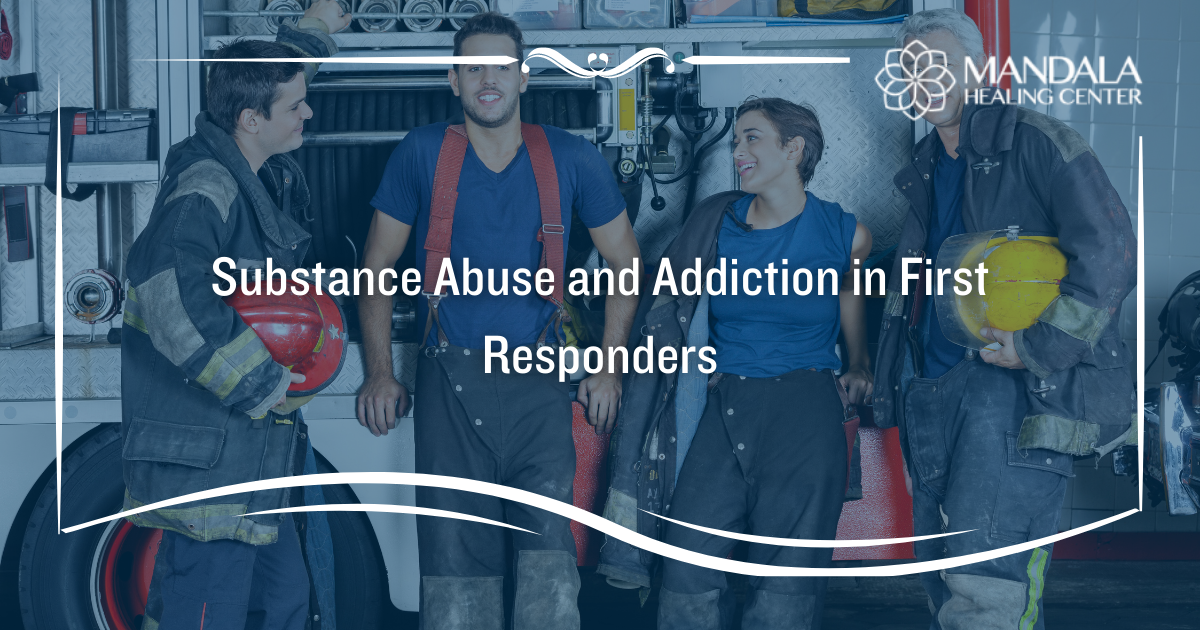First responders are the people on the frontline of life’s challenges. They are the ones who show up first to fires, medical emergencies, and natural disasters. Emergency responders routinely arrive first on the scene in some of the most dangerous and stressful events most people will only experience a few times–if at all–during their lifetime. To say first responders live with a high-stress level is an understatement.
Emergency responders don’t just show up–they are also composed, compassionate, and decisive. Their training teaches them to convey strength and calm to those they help, despite their own pain, stress, and exhaustion.
Many people from all walks of life use drugs and alcohol to gain temporary relief from their emotional pain. It’s no wonder that substance abuse among first responders is so high. Understanding the connection between first responders and addiction to drugs and alcohol can help people get better, more comprehensive treatment.
If you are a first responder and need addiction treatment, please contact the caring specialists at the Mandala Healing Center. Getting the help you need is a sign of strength. Contact us today to learn about your treatment options or for support.
Who are First Responders?
First responders, or emergency responders, are people trained to respond to emergencies. They safeguard society by arriving first at devastating events and working to provide emergency support and care to the people involved. First responders are the first to witness the effects of crimes, fires, natural disasters, and other traumatic events. They manage disasters, handle medical crises, put out fires, and rescue people from hazards. Some first responders include:
- Police officers
- Firefighters
- Military members
- Paramedics
First responders are trained to deal with devastating, life-threatening situations. They routinely work long hours to provide emergency support and may live with chronic stress or trauma due to their work.
Emergency Responders, Stress, and Addiction: Understanding the Connection
Chronic stress can cause physical, emotional, and behavioral harm. People who live with a high level of stress on a regular basis, including first responders, often have symptoms of stress that interfere with their ability to function, including:
- Headache
- Anxiety
- Increased or decreased appetite
- Muscle tension
- Anger or irritability
- Chest pain
- Fatigue
- Low libido
- Stomach upset
- Depression
- Insomnia and other sleep troubles
- Restlessness
- Feeling overwhelmed
While people often develop healthy ways to cope with daily stressors, chronic stress can overwhelm a person’s ability to manage it. Some people turn to drugs and alcohol to get relief from their stress. While using substances may temporarily mask the symptoms of stress, regularly using drugs and alcohol can lead to addiction.
When someone lives through a significantly stressful event, they may develop trauma. Trauma is the lingering physical, emotional, and behavioral effects of a stressful event, which can remain for months, years, and longer.
Symptoms of trauma include:
- Frequent, unwanted memories of a traumatic event
- Experiencing flashbacks–mentally reliving the traumatic event as if it were happening all over again
- Having nightmares about the traumatic event
- Experiencing distress when exposed to something that reminds you of the event
- Avoiding talking or thinking about the event or people and places related to it
- Feeling hopeless about the future
- Feeling emotionally numb
- Being easily startled or scared
- Feeling “on guard” for potential dangers
- Having trouble sleeping
First responders are trained to control their emotions in the moment, but the effects of trauma can stay with them. Many go on to develop post-traumatic stress disorder (PTSD). Some people use drugs and alcohol to manage their trauma and PTSD symptoms, which can lead to addiction.
What Substances Do First Responders Abuse?
First responders often use drugs and alcohol to cope with physical pain, stress, and trauma. For that reason, substances that reduce stress or alleviate pain are popular among emergency responders.
Some common substances of abuse among first responders include:
- Marijuana
- Opiate painkillers
- Benzodiazepines
- Alcohol
Using these and other substances can provide brief periods of relief from physical and emotional pain. But using drugs and alcohol to dull these feelings prevents people from learning and using healthy coping mechanisms–and it can lead to a life-threatening addiction.
Signs of Addiction in Emergency Responders
Recognizing the signs of substance abuse and addiction can be the first step toward getting the help you need to recover. Some of the signs of addiction include:
- Changes in physical appearance, including weight loss or gain
- Neglecting personal hygiene
- Isolating or giving up hobbies and relationships
- Needing to use more of a substance to get the same effects
- Falling behind at work, home, or school because of substance use
- Legal, social, or financial trouble related to substance use
- New or worsening changes in mental health
- Experiencing withdrawal symptoms if you reduce or stop using the substance
- Continuing to use drugs and alcohol despite negative consequences
First responders may worry about the stigma surrounding mental illness and addiction. Some may worry about what their colleagues will think if they admit they struggle with substance abuse, or they may fear they’ll lose their job. But first responders must seek addiction treatment to remain healthy enough to do their job well and live full, healthy lives.
Get Help Now
If you are among the many first responders living with substance abuse or addiction, don’t wait another day to get the support and treatment you deserve. You do not have to carry the burden of stress, trauma, and addiction alone. Compassionate, effective treatment is a phone call away. Reach out to the caring specialists at the Mandala Healing Center today to learn about your treatment options.












